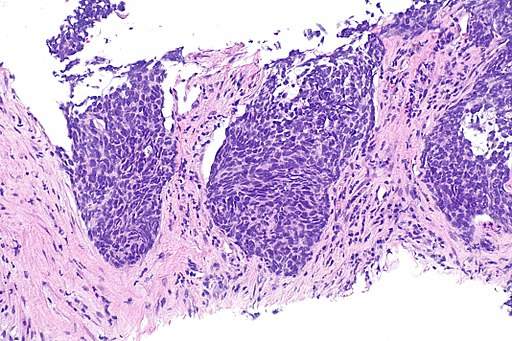
Roche has announced positive results from its Phase III trial testing immunotherapy drug Tecentriq in combination with Avastin and chemotherapy medications carboplatin and paclitaxel for the treatment of non-squamous non-small cell lung cancer (NSCLC).
The IMpower150 trial enrolled 1,202 patients with stage IV non-squamous NSCLC who had not been previously treated with chemotherapy. Participants were randomised in a 1:1:1 ratio to receive one of three combination treatments: Tecentriq plus carboplatin and paclitaxel; Tecentriq and Avastin plus carboplatin and paclitaxel; or Avastin plus carboplatin and paclitaxel.

Discover B2B Marketing That Performs
Combine business intelligence and editorial excellence to reach engaged professionals across 36 leading media platforms.
The trial’s co-primary endpoints were progression-free survival (PFS) and overall survival (OS), measured using the Response Evaluation Criteria in Solid Tumours Version 1.1.
The Tecentriq combination treatments were shown to increase patients’ survival by a larger margin than the treatment consisting of the two chemotherapies and Avastin. Survival benefit was observed across a range of subgroups, including those with varying levels of the protein PD-L1. As such, Roche may be able to market Tecentriq to a variety of cancer patients, not just those with specific biomarkers.
Safety for the combination was consistent with the known safety profile of each individual medicine, with no new safety signals identified in the combination.
“We are pleased the IMpower150 study demonstrated a clinically meaningful survival benefit for people receiving their initial treatment for this type of advanced lung cancer,” Roche chief medical officer Sandra Horning said.

US Tariffs are shifting - will you react or anticipate?
Don’t let policy changes catch you off guard. Stay proactive with real-time data and expert analysis.
By GlobalData“These results add to the growing body of evidence supporting the role of combining Tecentriq with Avastin. We will submit these additional data to global health authorities and hope to bring this potential treatment option to patients as soon as possible.”
Data from the trial is due to be submitted to health authorities worldwide, including the US Food and Drug Administration (FDA) and European Medicines Agency (EMA).
Though specific OS data has not yet been released, the positive nature of the results strengthens Roche’s chances of successfully rivalling better-established immunotherapy treatments such as Merck’s Keytruda and Bristol-Myers Squibb’s Opdivo.
Tecentriq is a monoclonal antibody designed to bind to the protein PD-L1, which helps tumours avoid detection. By inhibiting PD-L1, Tecentriq can help activate T cells and has the potential to be a foundational combination partner with immunotherapies, targeted medicines and various chemotherapies. It is already approved in the EU, US and more than 60 countries for people with previously treated metastatic NSCLC and for people with locally advanced or metastatic urothelial cancer who are not eligible for cisplatin chemotherapy, or who have had disease progression during or following platinum-containing therapy.
Tecentriq is currently being examined in seven other Phase III lung cancer studies, either alone or in combination with other medications. Three more of these studies are expected to report this year.
The drug has already demonstrated efficacy in boosting PFS in patients with advanced squamous NSCLC when combined with chemotherapies carboplatin and Abraxane. This treatment was compared to chemotherapy alone, with results announced last week.
Lung cancer is the leading cause of cancer death in the world, causing 1.59 million deaths every year. NSCLC is the most common type, making up around 85% of all cases. The squamous form of the disease is characterised by flat cells covering the airway surface when viewed under a microscope.





